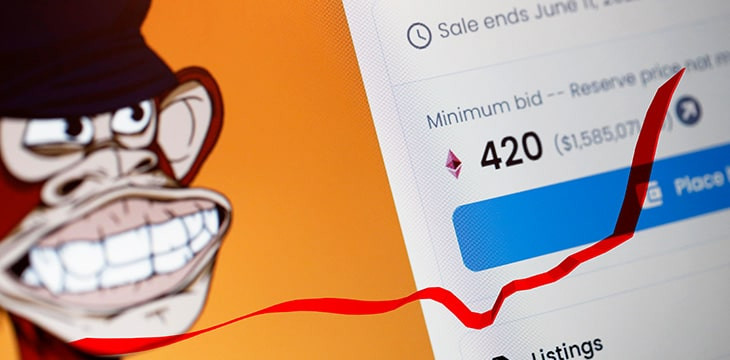The company behind the multi-billion dollar NFT collection Bored Ape Yacht Club (BAYC) has sued an artist it claims has been selling copycats of their NFTs and making millions of dollars from the venture. Yuga Labs accuses Ryder Ripps of scamming users into purchasing his NFTs using the company’s images and many of its trademarks.
Since they launched in 2021, BAYC NFTs have become extremely popular, fueled by a flurry of purchases by celebrities such as Madonna, Snoop Dogg, Steph Curry, Jimmy Fallon, and more. They peaked in April this year, with the floor price, or the lowest price at which you can buy a BAYC NFT hitting over $400,000. This pushed the valuation of Yuga Labs to $4 billion when it raised $450 million in March this year.
BAYC’s success has attracted many imitators, with Ryder Ripps being the most prominent so far. On his website, Ripps claims that his work “uses satire and appropriation to protest and educate people regarding The Bored Ape Yacht Club and the framework of NFTs.”
Yuga Labs isn’t convinced, and it has now gone to court over trademark infringement. It filed the lawsuit in the Central District of California, demanding a trial by a jury against Ripps, Jeremy Cahen, and other defendants.
On Twitter, Yuga Labs claims that the lawsuit is to “put a stop to the continuous infringement, and other illegal attempts to bring harm to us and the BAYC community.”
(2/2) … us and the BAYC community, we have filed a lawsuit against the responsible parties. We will continue exploring and pursuing all legal options at our disposal.
— Yuga Labs (@yugalabs) June 25, 2022
Yuga Labs dismissed Ripps’ claims that his work is just for satirical purposes, saying that he “conveniently rakes in millions in ill-gotten profit from sales of the RR/BAYC NFTs using Yuga Labs’ marks to make those sales.”
“Copying is not satire, it is theft. And lying to consumers is not conceptual art, it is deception.”
The conceptual artist has maintained that buyers fully know they are not purchasing original BAYC NFTs. Before purchasing his copycat NFTs, buyers have to agree to terms on his site that lay out that “by purchasing Ryder Ripps artwork in the form of an NFT, you understand that it is a new mint of BAYC imagery, re-contextualizing it for educational purposes, as protest and satirical commentary.”
Still, Yuga Labs says the artist has caused damages and irreparable injury with an incalculable loss of goodwill. It accuses Ripps of false advertising, unfair competition, trademark infringement, unjust enrichment, intentional interference with prospective economic advantage, and more. It’s seeking injunctive relief and damages.
The NFT ownership debate
The Yuga Labs v Ryder Ripps lawsuit taps into the heart of a debate that has been ongoing for the past two years—just who owns an NFT, and what constitutes infringement?
NFT skeptics have characterized them as overpriced JPEGs, with the most well-known one, Elon Musk, famously mocking them by using a collection of BAYC NFTs as his Twitter profile picture, even though the images were owned by people who had paid millions for them in a Sotheby’s auction.
Yuga Labs isn’t taking the infringement by Ripps lightly. Founder Gordon Goner (a pseudonym) called Ripps a “demented troll” in a recent blog post as he defended the company’s legal actions.
However, Ripps has defended his actions and maintained that he’s just against Yuga Labs, which he says has been lying to millions of people who have aped into their Bored Apes.
In an interview two weeks ago, Ripps stated, “The craziest thing to me is that this company has made billions of dollars and has sold people on a complete lie, which is that they own commercial rights to these drawings. What they really mean is just that they don’t care who uses them, and won’t sue anybody.”
NFT marketplaces have already taken a stand against Ripps, with OpenSea, which is the largest, removing them from its platform. It claimed the reason was because of a claim of intellectual property infringement. The collection had sold $3.5 million on OpenSea before it was taken down. Foundation, another NFT marketplace, also took down the collection after receiving a Digital Millennium Copyright Act request.
Watch: The BSV Global Blockchain Convention presentation, Buzzmint: Elevating NFTs
 coingeek.com
coingeek.com
